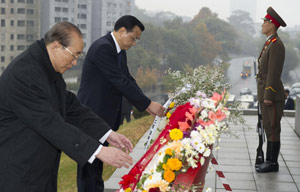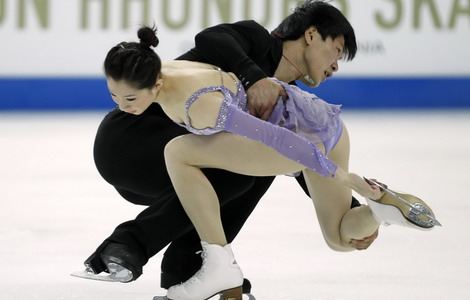Pair are jailed for leaking State secrets
Updated: 2011-10-25 07:51
By Wang Huazhong (China Daily)
|
|||||||||||
BEIJING - Two officials from China's statistics bureau and its central bank have been jailed for leaking secret data to securities traders in the wake of similar cases that disturbed the market last year.
Li Zhongcheng, a senior prosecutor of the Supreme People's Procuratorate, China's top prosecuting authority, said on Monday in a news conference that four other suspects from the securities industry were also implicated in leaks of State secrets.
Industry insiders and researchers say that in the past leaks of macroeconomic data by authorities have been reported in the media and affected stock markets and cost individual investors billions of yuan.
"It jeopardizes the order of market operation, disturbs free market competition and affects public confidence in the government," Li said.
"It causes serious damage to the country, society and the people's interests, and is a kind of crime that is very detrimental to society."
Li said that "after every leakage, the stock market fluctuated abnormally, and unfair phenomena would follow after the abnormality".
Li, citing the verdict by the Xicheng District People's Court of Beijing, said Sun Zhen, former deputy director of the secretariat office of National Bureau of Statistics, got a five-year jail term for leaking 27 secret statistics 14 of them classified to two traders between June 2009 and January.
Wu Chaoming, a researcher at the People's Bank of China's monetary and financial history research office got six years for leaking 25 "confidential State secrets" to 15 traders from January to June last year.
The secrets Sun and Wu gave to traders included data on the consumer price index (CPI), producer price index, industrial value-added output, monetary growth and GDP.
A Beijing-based trader, who asked not to be named, said big traders who received the leaked information, for instance CPI, which is used as a measure of inflation, would buy or sell stocks before the government announced changes to monetary and financial policies.
"They make money from the time difference and flee risks earlier to leave individual investors bearing the loss," he said.
"Monthly release of CPI became especially sensitive to the market since we have been on a fast track of CPI growth starting last year."
Last November, two days before an official announcement, there were media reports about predictions by securities firms that the CPI had risen 5.1 percent year-on-year. On the day of the leak, the Shanghai Composite Index dipped 1.32 percent.
Du Yongsheng, spokesman of the National Administration for the Protection of State Secrets, said that "the leakage cases are actually driven by interests".
"Some (officials) have built partnership with securities traders to guide them to buy or sell stocks for profits. Some received fat lecture fees for attending workshops and forums organized by securities companies," Du said.
Dong Dengxin, director of the Finance and Securities Institute at Wuhan University of Science and Technology, said internal management of secret information must be strengthened because the market is increasingly sensitive to releases of such data.
Du added authorities would step up efforts to improve the management of the data.
To mitigate the risk of leaks, the statistics bureau said last year that it would cut the number of people handling the secrets and their access, and shorten the interval between data compilation and release.
Hot Topics
New sex education textbooks were introduced to pupils in Shanghai on Monday after numerous debates on early-age sex education in China.
Editor's Picks

|

|

|

|

|

|







